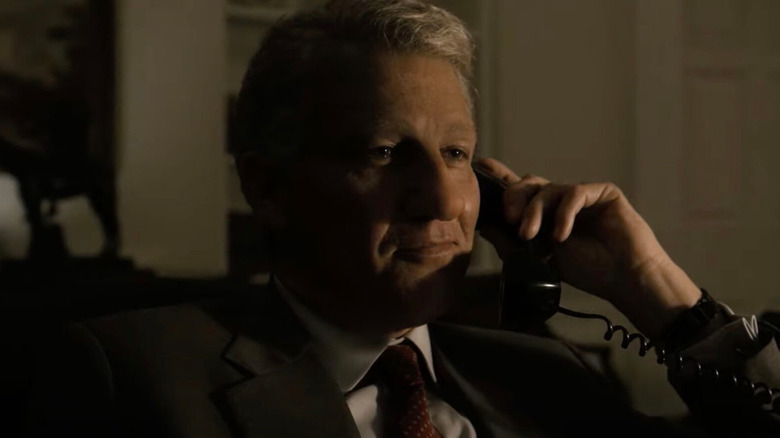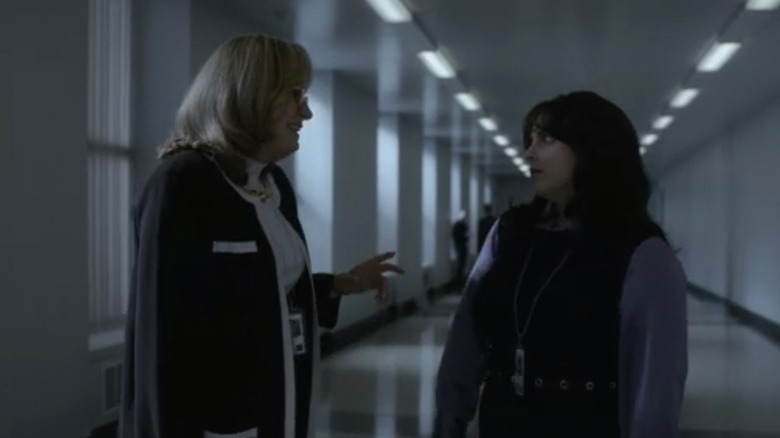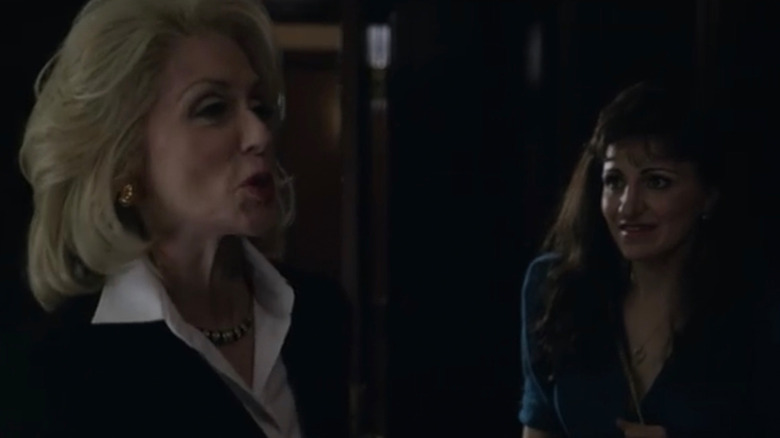How Accurate Is Impeachment: American Crime Story Episode 2?
"Impeachment: American Crime" is the latest season of the FX anthology series by Ryan Murphy, which devotes an entire season to chronicling a well-known scandal in American society. It's the third overall season of "American Crime" and it depicts arguably the most notorious incident in American politics over the last 30 years: the Bill Clinton impeachment scandal. Focusing on the women most directly connected to the scandal — Monica Lewinsky (Beanie Feldstein), Linda Tripp (Sarah Paulson), Paula Jones (Annaleigh Ashford), and Kathleen Willey (Elizabeth Reaser) –"Impeachment" aims to tell a side of the story that the media has often overlooked.
Episode 2, titled "The President Kissed Me," aired on September 14, 2021. As the title suggests, it delves into the origins of Lewinsky's relationship with President Clinton (Clive Owen), as well as the start of Tripp's involvement in the situation. Meanwhile, as the Paula Jones lawsuit against Clinton picks up steam, conservative activist Susan Carpenter-McMillan (Judith Light) inserts herself into the case.
But not everything in this based-on-a-true-story tale actually happened. Here's what's fact and what's fiction.
The courtship of Monica and Bill: mostly accurate
Monica Lewinsky and President Bill Clinton's relationship begins in 1995, when a government shutdown forces the White House to bring in interns to cover for furloughed staff, including Lewinsky. During this period, Lewinsky and Clinton begin flirting from afar. Lewinsky surreptitiously shows Clinton her thong from across a room. Finally, Clinton and Lewinsky meet in George Stephanopolous' office, where they kiss. As their relationship begins, Lewinsky has to go through Clinton's secretary, Betty Currie, whenever she wants to contact him. Often, Lewinsky and Clinton exchange gifts with each other.
According to Madeleine Kaplan, researcher on Slate's Lewinsky-Clinton season of the "Slow Burn" podcast, the government shutdown really did facilitate their relationship. Lewinsky and Clinton did share their first kiss in Stephanopoulos' office, the gifts they exchanged are documented in the Starr Report, and Betty Currie did act as a liaison for their affair (via Vulture). Lewinsky did actually flash her underwear at Clinton in the White House; it's one of the most salacious details from the entire Starr Report.
The only major discrepancy is that not all of these moments happened in quite the same order or at the same time. For example, in real life, Lewinsky kissed Clinton and showed her thong on the same day.
The real Lewinsky, who is serving as a producer on the show, insisted that the thong moment appeared in the show. "Listen, I would've loved to have been really selfish and said, 'That's great that you guys think we don't have to show that, fantastic,' but I'm incredibly experienced in understanding how people see this story," Lewinsky told The Hollywood Reporter. "So, ultimately, I felt two things: One was that I shouldn't get a pass because I'm a producer; and two, that it was unfair to the team and to the project because it would leave everybody vulnerable."
What Monica told her friends about it: disputed
Overall, Monica Lewinsky told 11 people about her affair with President Clinton before it came to light, and this episode shows two of those moments. First, Lewinsky tells her best friend Cat, who strongly advises her to pull back, reminding her about her tendency to date unavailable men. Later, after she's transferred to the Pentagon and Clinton wins re-election, Lewinsky tells Linda Tripp. Tripp, whom the show established as out to get the Clintons in Episode 1, encourages Lewinsky to continue the affair and divulge more information.
In real life, Cat is Catherine Allday Davis, Lewinsky's college friend and indeed one of those 11 people Lewinsky told about the affair — although Davis was living in Japan at the time this happened (via Vulture). In 1998, Lewinsky's lawyer, William Ginsburg, did confirm that she'd had an affair with a 40-year-old married man while she was attending Lewis & Clark College (via CNN).
According to Kaplan, the biggest inaccuracy in Episode 2 is Tripp's reaction to the revelation. Lewinsky characterized Tripp as eager to learn everything about her affair with Clinton. Tripp, meanwhile, later claimed the information "disgusted" her, and that she was acting out of an urge to protect her friend (via Vulture). Only Tripp, who passed away in 2020, knew her true motivations.
Susan Carpenter-McMillan: accurate
Finally, the ongoing Paula Jones lawsuit takes a turn when Susan Carpenter-McMillan blindsides Jones' lawyers by joining the case as Jones' activist. Carpenter-McMillan introduces herself as the president of the Women's Coalition, a nonprofit devoted to "conservative feminism." While Jones' original lawyers urge her to keep quiet until the Supreme Court rules on whether her lawsuit can proceed against a sitting president, Carpenter-McMillan urges Jones to go public with her story to pressure Clinton, which Jones does.
As everyone who followed the Clinton impeachment scandal no doubt remembers, Carpenter-McMillan is a real person who did become Jones' main advisor and spokesperson. In 1997, Slate described her as "a first-class media hound, blessed with a savage wit, good looks, and — as one enemy put it— 'the tact of a bulldozer.'" She was known for her frequent fiery TV appearances in which she denounced Clinton in no uncertain terms (via Vulture and Slate).
Like with Tripp, the one aspect that's uncertain is Carpenter-McMillan's true motivations. Carpenter-McMillan always claimed to be someone who was making sure Paula Jones was central to the case. But the show implies that Carpenter-McMillan was working to advance a conservative goal to force Clinton to go to trial, where he would inevitably perjure himself. Like many details on this show, the "truth" behind people's motivations is impossible to know for certain.
If you or anyone you know has been a victim of sexual assault, help is available. Visit the Rape, Abuse & Incest National Network website or contact RAINN's National Helpline at 1-800-656-HOPE (4673).



